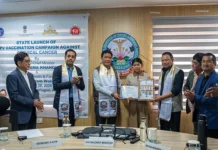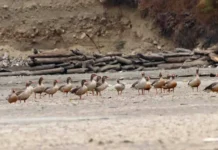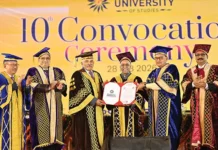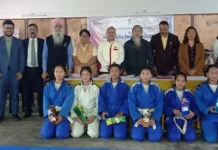[ Damien Lepcha ]
Arunachal Pradesh, a frontier state rich in cultural diversity and strategic significance, continues to face governance challenges not because of lack of intent or capability, but due to structural constraints within the bureaucracy.
A core issue at the heart of this is the absence of a separate cadre of Indian Administrative Service (IAS) and Indian Police Service (IPS) officers for the state.
Instead, it remains yoked to the Arunachal Pradesh-Goa-Mizoram-Union Territories (AGMUT) cadre. Officers are posted to Arunachal for short stints, often between 24 to 36 months, before being transferred elsewhere. The result? A bureaucratic relay race, where officers rarely stay long enough to finish the laps they start. Each successor has to start from scratch – relearning, rebuilding and often redoing what was already in motion.
A demand echoing for years
Chief Minister Pema Khandu has long championed the cause for a separate cadre. On 18 October, 2017, the Arunachal Pradesh Legislative Assembly unanimously passed a resolution demanding a distinct cadre for the state. The matter was officially communicated to the Ministry of Home Affairs, marking a formal beginning to what has now become a persistent cry for administrative justice.
Khandu renewed this call in September 2022, stating in the state assembly: “Because of the absence of a separate cadre, central schemes cannot be implemented and executed properly. Officers from AGMUT come to Arunachal for a short period and are not able to understand tribal culture and sentiments.”
The sentiment is widely shared across the state machinery. Officers require months – sometimes years – to understand the region’s terrain, tribal nuances and administrative peculiarities. Just as they become effective, they are transferred out. Institutional memory vanishes, momentum stalls, and projects suffer.
Policy paralysis by transfer orders
In Arunachal, development projects demand not just technical planning but cultural fluency. From road construction in remote Anjaw to disaster management in several far-flung districts, every intervention must be rooted in an understanding of local dynamics. Short-term tenures strip governance of this essential learning curve.
Time and again, talented officers posted in the state have shown initiative – whether in revamping district health infrastructure, improving
school attendance, or curbing corruption at the grassroots. But those who do well are often transferred before their impact can be institutionalised. Their exit resets the system. Officers who have built trust with local communities must abandon halfway, leaving departments demoralised and policies hanging in limbo.
This administrative musical chair is more than frustrating – it is expensive. Schemes are relaunched instead of reviewed. Roads remain half-built. Public grievances are repeated to new faces. The clock restarts every time a capable officer is replaced midway.
In the police sector, the implications are equally serious. Law and order in a border state like Arunachal demand experienced leadership attuned to regional complexities. IPS officers from outside, with little to no prior exposure to the Northeast, are thrust into sensitive districts where insurgency threats, cross-border issues and local disputes require nuanced handling. Just as they begin to build rapport and operational strategy, they are transferred out, forcing the police machinery to reset under new leadership.
Voice in Parliament
In December 2021, Arunachal’s Lok Sabha MP Tapir Gao raised the issue in the Parliament, advocating separate IAS, IPS, and IFS cadres not only for Arunachal but also for Mizoram. Gao’s concern went beyond administration. He stressed that governance in Arunachal demands cultural immersion, long-term commitment, and strategic clarity – all of which are impossible when officers view their posting as a short tour of duty.
“How can someone lead us” Gao asked, “if they don’t stay long enough to know us?”
His question resonates in every district office and remote village where development has stalled not for want of funds or plans, but due to a lack of continuity.
What a separate cadre would fix
A dedicated IAS and IPS cadre for Arunachal would bring transformative change. Officers would no longer treat their assignments as temporary pitstops. Longer tenures would allow for deeper engagement, better accountability, and project consistency.
It would also create the space for grooming local officers who understand tribal customs, regional aspirations and border sensitivities; officers who know the difference between managing affairs in Itanagar versus Miao, not just geographically but socially and politically. Officers who can invest not just time, but heart.
Moreover, stable postings would improve inter-departmental coordination, possibly reduce corruption, and foster long-term relationships between administration and civil society.
In the case of IPS officers, it would mean a consistent crime-fighting strategy, continuity in intelligence gathering, and better coordination with military and paramilitary forces in border areas. It would empower police leadership to act decisively without fearing imminent reshuffling.
The cost of delay
While the Government of India has acknowledged the request, there has been no official movement towards granting Arunachal its own cadre. The delay is not merely bureaucratic – it is developmental. Every year lost in indecision results in another cycle of halted projects, frustrated communities and wasted potential.
In a state as strategically significant and culturally rich as Arunachal, governance cannot be left to rotational roulette. It needs institutional anchors, long-term vision, and officers who stay long enough to deliver on promises.
Arunachal doesn’t just need IAS and IPS officers. It needs committed administrators-champions who understand the pulse of the region, who live its challenges, and who help shape its future.
The state has waited long enough.
The Centre must act – not with sympathy, but with seriousness. And it is time that the state government voiced its concerns once again – with renewed urgency and unified political will. (The contributor is Sub-editor, Arunachal Pioneer)




